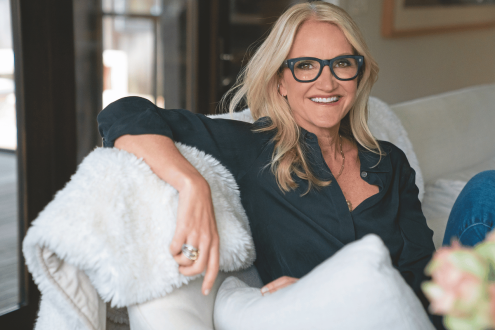Stop being a people pleaser and say how you really feel
Do you find yourself agreeing with others to keep the peace? Or mulling over a conversation and regretting the things you didn’t say? For ‘easy-going’ Ellen Tout, enough was enough – she wanted to start saying how she truly felt

6 minute read
Being the accommodating friend and colleague has always garnered me praise: a good listener, rarely rocks the boat and happy to go along with the majority. But, recently, I’ve found I want to shrug off that mantle and speak up for myself.
In my friendship group, for example, a few people don’t speak to each other at points and often moan to me about the others. I feel deflated and frustrated by the situation but, instead of telling them, I listen to each person and try to keep the peace. I know it’s not the best way to solve matters in the long term, but I also don’t want to make things worse.
Shoulda, woulda, coulda!
Often, after a conversation, I reflect on what I should have said but, in the moment, I say nothing. What’s stopping me? Mostly, I worry about being misunderstood or creating conflict, so I stay silent, with what I want to say running through my head. I talk to psychotherapist Fe Robinson to examine this. She urges me to explore my feelings around clashing with someone. What result do I want? What do I need in the moment to achieve this? Why do I think it’s easier to avoid arguments than to disagree? What’s at risk if I just say what’s on my mind?
I realise that I fear creating tension and upsetting other people, so I use silence to keep them ‘safe’. When I think of an argument, I think of anger, upset and fear. It feels infinite; a danger zone that I want to avoid. It will surely end in rows, not resolution. I realise I’m so used to protecting other people’s feelings that I put my own opinions and emotions aside. It doesn’t feel worth the risk of upsetting people, and I don’t want to damage my relationships.
Also, when I do plan to jump in, I hesitate and overthink how to phrase my point – missing my chance. Even when I am certain of my opinion, I need more space and time before responding. Afterwards, I think about what I should have said and get annoyed with myself. ‘It sounds like you are taking responsibility for others’ feelings; that if they’re upset, it’s your fault,’ says Robinson. She says we can take ownership of people’s reactions, to both of our detriment. That’s familiar: What if what I say hurts them? What if they think differently of me? She asks me to rethink this and to remember that, while something we say may be a trigger for someone else, we’re only responsible for our own feelings. She reminds me that it may be important, and kinder at times, to say something another person might find upsetting.
The passivity trap
With regards my friends, sitting down for an honest conversation has become increasingly important as our current dynamic is damaging my relationship with some of them. At work, there are also situations where, by not speaking up, I’m causing myself problems or missing out.
It dawns on me that I’ve fallen into a pattern of telling myself it’s easier to stay quiet. ‘There are two places we tend to go when we feel unsafe,’ says Robinson, ‘we become passive or aggressive and use silence or violence.’ I definitely use silence and become passive. I need to find a balance.
It’s OK to oppose
There is one person with whom I can easily get things off my chest – my sister. We often disagree, yet we have a good relationship. We argue all the time but resolve our issues. My sister and I have been known to ignore each other for a few hours after a row and then just forget about it; or to quarrel during dinner and be laughing by dessert. I don’t feel the same restraint with her and I’m sure we’ll still be friends after an altercation. If she wants an honest opinion, she’ll ask me, and I won’t hold back.
After this revelation, Robinson suggests that I do know how to argue well, I just need to draw on that experience and translate it into other relationships. ‘People who value your relationship enough can go through the rupture and repair of disagreement – a natural part of relationships,’ she explains. I want to find that same sense of security when speaking up with my friends and colleagues.
My first opportunity comes with my girlfriend. Although I feel more comfortable being frank with her, I can still sometimes refrain from comment or worry excessively. We’re talking about moving in together and she makes a remark about disliking a flat we viewed. I misunderstand her and think she’s gone off the idea of living together. My instant reaction is to go quiet and worry – my flight response. In the past, I might have just left it for fear of causing a row or played it over in my mind for a few days before talking about it.
I remind myself that our relationship is strong and that ignoring the issue won’t resolve it. I’m surprised how nervous it makes me feel, but I ask what she means and explain my view. It doesn’t get heated – despite my irrational fear – and she says that she just didn’t like that flat. It’s a small thing but it shows me the value of changing my learned response, even if it’s uncomfortable.
In work situations, speaking up is more challenging, particularly when I need to think on my feet. When I feel put on the spot, I become flustered and I know I don’t explain myself well, which is frustrating. Robinson suggests I create time for reflection in these situations, which takes the pressure off me and also helps my colleagues. ‘Saying things like “I need a moment to think about that” can help people learn how best to work with you,’ she says. I practise, and find that asking, ‘Can I come back to you on that?’ is useful. By creating that break, I have time to respond, rather than just react.
Put my mind to it
Tania Diggory, coach and founder of Calmer, suggests I meditate before a meeting or tricky conversation to help me feel empowered. She also encourages me not to overlook how open body language and a firm tone of voice can help me feel confident. ‘Ensure that you give yourself moments to tap back into that state of empowerment,’ she says. I find I can do this by pausing, readjusting my body, sitting tall and taking a deep breath. ‘This sends a feedback loop in your brain and has an impact on your mood and behaviour, especially if you feel yourself losing control,’ she says.
This new awareness helps, but my monkey mind still takes over in the moment. At a new freelance workplace, a colleague asks me to back him up by letting management know that others are missing deadlines. I say I will, but I skim around the topic when the time comes. I fear I’ll cause conflict and that the manager will react badly. I also worry whether, as a freelancer, it’s my place to say anything. But, when the situation crops up again, I realise I do need to speak up – they are making my role more difficult and I owe it to myself.
Robinson suggests planning my points and the desired outcome in advance, so my mind is clear before I speak. I still feel uncomfortable but, armed with my notes, I explain to our manager. She calls me into another room and I panic, but she’s keen to talk about the problem and is grateful that I opened up to her. It’s a relief and it shows me how, when approached well, speaking up can help find a solution. I feel far more optimistic after our meeting.
Diggory also highlights the importance of active listening. ‘When you feel like you’ve got lots to say, it’s natural to want to get everything off your chest,’ she says. ‘But it’s likely that the other person is feeling that way, too – so are you really listening to each other?’ She suggests letting the other person speak first, then taking my turn.
Robinson reminds me that not all discussions need resolutions. ‘You can honour people while holding a different opinion,’ she says. ‘People can be passionately telling you their truth, and you can leave it on the table; it doesn’t have to be true for you.’ This is how it is with my sister – we don’t always see eye to eye but we still respect and value each other. I can see that, rather than worrying about agreeing with everyone, I should focus on being honest and driven by my values.
I matter, too
All this advice allows me to reframe how I see conflict. It doesn’t come naturally to me, but I’ve found small ways to build myself up so I can choose when to speak up and how to better navigate discussions when I do. I’m an introvert and I need time to think things over, but I’m learning not to feel under as much pressure to react in the moment and know it’s OK to take my time to think before I respond.
My worries and thought patterns had been holding me back and I’d been putting my concerns about other people’s feelings before my own. I see now that avoiding arguments doesn’t protect the other person or solve the problem. By not voicing my feelings and opinions, I miss valuable opportunities to show what I think, what I have to contribute – and who I really am.
Fe Robinson is a UKCP-accredited psychotherapist; ferobinsonpsychotherapy.co.uk. Tania Diggory is a coach and founder of Calmer; thisiscalmer.com
Image: Getty









